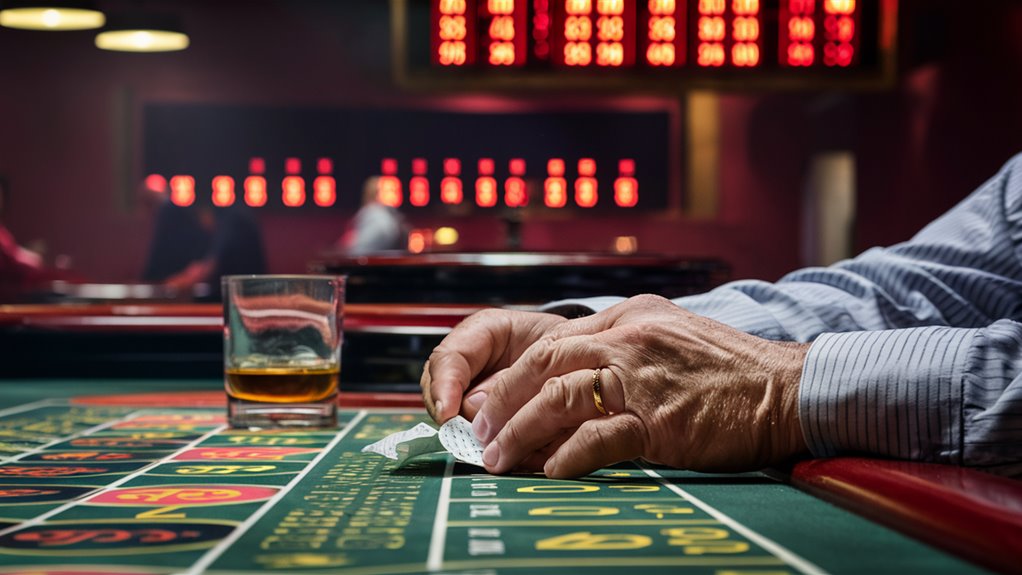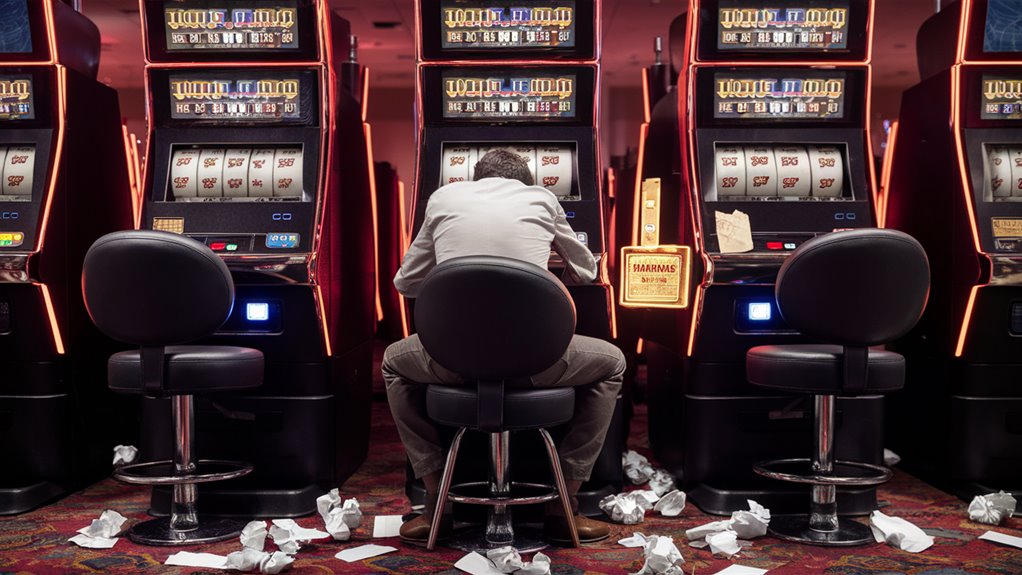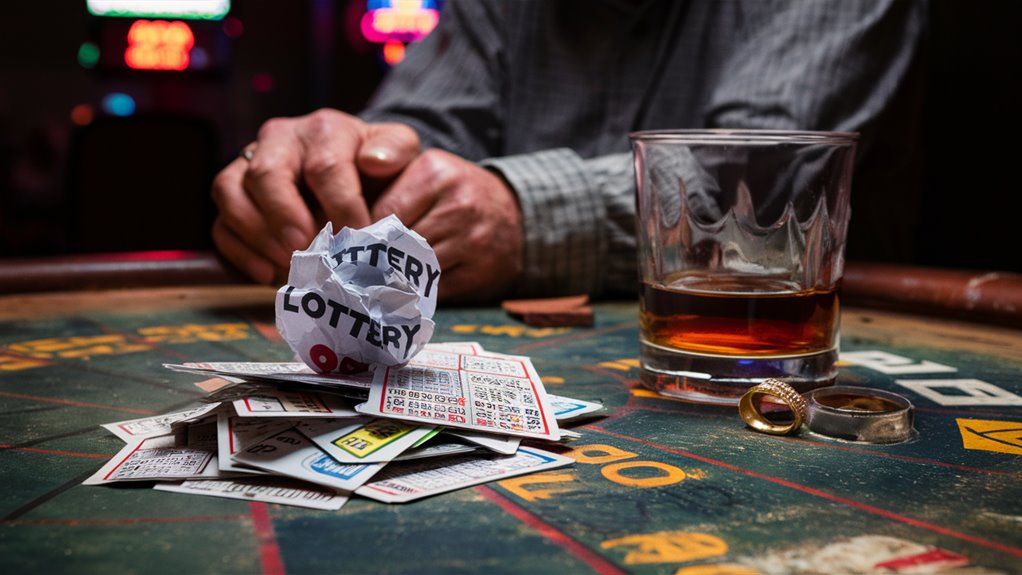How Gamblers Think About Bad Choices

Mind tricks play a big part in gamblers backing their bad choices at casinos and betting spots. The gambler’s mistake builds a risky mindset where players think past losses must lead to future wins, even though each bet is its own thing.
Main Mind Tricks
Picking what to remember turns out to be a big deal, making gamblers remember wins well but either little or not at all their big losses. This mind trick keeps bad betting habits going and makes gamblers think they do better than they do.
Chasing Losses
When facing growing losses, gamblers often bet more in a fast and risky way to get back what they lost. This big bet move usually ends up in more loss and makes the tough cycle of problem gambling worse.
Feeling in Control
The feeling of control happens when gamblers wrongly believe their skills or plans can change what are really just random results. This trip up leads to too much trust in betting systems and magic thoughts about “lucky” numbers or rituals.
Near Misses
Near misses spark brain responses like real wins, pushing strong mind ties. These close tries work as half wins that keep gamblers playing even though they keep losing.
Social and Place Triggers
Seeing other players win and well-thought-out casino setups give outside reasons to keep gambling. These outside hints work with internal tricks to build a big storm of self-talk that makes quitting gambling extra hard. Thawing Cold Runs With Measured Aggression
The Gambler’s Mistake
What is the Gambler’s Mistake?
About the Gambler’s Mistake
The Gambler’s Mistake is a big wrong idea in guessing odds where people wrongly think what just happened changes what will happen, even when the chances are the same each time. This mind trick makes players choose poorly, using past game turns to decide.
Examples of this Mistake
In games like roulette, slots, and coin tosses, after seeing several “red” results, many bet “black” will be next. This wrong thought misses the main rule that each turn is its own thing.
Each Turn is its Own
Each play keeps its odds no matter what just happened. For example, a coin getting heads six times still has a 50% chance of tails next time. The coin doesn’t “remember” what came before.
Our Brains and Betting
Our brains like to see ties and flows in things that are really just random. This old trait helps in many parts of life but leads to wrong calls in betting. Players set up big plans on these fake flows, even though they don’t hold up in the stats.
How This Mistake Changes Bets
This mix-up often leads to:
- Betting more after losing
- Too much trust in guessing skills
- Growing losses because of the belief a win “must” come next
- Betting patterns that don’t fit the real math
Knowing Better Helps
Learning that each bet is its own can help with smarter gambling. Every bet starts fresh, never needing to make up for what happened before. Knowing this helps avoid betting based on past turns.
Chasing Losses
Why Chasing Losses is a Bad Idea
Behind Chasing Losses
Chasing losses is a harmful way to gamble, happening when players try to win back money through bigger bets. This habit gets worse as more money is lost, messing with making smart choices.
Signs of this Bad Habit
Players deep in this habit often: Navigating Soft Edges for Consistent Wins
- Bet more than planned
- Move to riskier games
- Play longer than they thought they would
- Bet without thinking it through
Why it Happens
Two main mind things drive this:
- Not liking to lose: Feeling worse about losing than feeling good about winning the same amount
- Bad bet logic: Thinking past money lost must lead to keep playing
How Bad This Can Get
Money Trouble
- More money lost quick
- Money saved goes away
- Getting into debt
- Money problems grow
Mind Trouble
- Feeling more worried
- Feeling really low
- Feeling bad or guilty
- Feeling worse in the head
- Strong bad feelings stick around
Breaking Away from Chasing Losses
Knowing you can’t win back lost money through more gambling is key in breaking this bad pattern. Often, getting help from a pro makes a big difference in stopping this damaging way to bet.
Seeing Just the Wins
How Selective Memory Messes with Gamblers

Thinking Only About Wins
Seeing just the wins is a major mind trick in gambling, changing how gamblers remember what happened. This mind play lets gamblers keep clear memories of good times and less or none of losses, showing a risky view of how well they do. Safeguarding Bankrolls in Whirling Market Conditions
Big betters often remember winning a lot and big money rounds but can barely think back to times they lost a lot. This mind trick makes them feel over sure and keep the wrong idea that gambling pays off. The brain makes a star reel of victories, hiding losses.
When We Don’t See the Full Picture
This way of not seeing all makes it hard to act fair. It’s not about trying to trick on purpose, this head trick helps keep the gambling going by painting a too-good picture of how it goes. Putting the real risk aside makes it hard for gamblers to really know their full game story.
Doing Better by Keeping Track
To fight this mind slip, setting up a good record system is key. Keeping clear notes of both good and bad rounds shows hard proof that can fight the memory tricks. This step lets gamblers see the true story of their game life and helps make smarter choices when playing.
Best Ways to Keep Records
- Note every game move well
- Mark dates, times, and game facts
- Write wins and losses right away
- Keep an ongoing count of money played
- Look at notes often to keep them right
With solid tracking and real look-backs, players can see and fix how selective memory changes their game ways.
Feeling Over Sure in Games
Thinking We Can Control Games
How We Trick Ourselves in Gambling
The feeling of control is a major wrong idea in betting, making players think they can change random turns. This mind trick shows in many odd actions and bet plans gamblers make, none changing game ends at all.
Seeing Control Where There’s None
Players often do things like:
- Blowing on dice
- Picking “hot” or “cold” slots
- Setting up big bet plans
- Taking game turns from what just happened
Randomness in Games
In games of just chance, each turn is by itself using random number making. The real math shows that:
- What just happened doesn’t change what comes next
- House edge is the same no matter the plan
- Chances are fixed each new game
Almost Wins Push False Hope
The almost win effect really pushes the wrong idea of control. These planned close tries work as big mind pushes that:
- Make players think their system works
- Keep them playing even with losses
- Set up wrong hopes for soon wins
Getting how these mind things work helps players see and skip bad gambling moves set by feeling too sure.
Almost Winning in Gambling
The Pull of Almost Winning
How Close Calls Mess with Us
The almost win effect is a big mind player that really shapes how we gamble. Close tries light up the brain like true wins do, making almost wins feel like they’re pushing us toward a real win. This brain buzz makes gamblers stay in the game. 온카스터디 인증리스트 추천
Planned Close Calls in Games
Slots and new game places on purpose put in almost wins more than would happen on their own. When players see almost the right mix for a big win, the brain thinks it’s nearly there, not just a plain loss. This smart game make-up pulls players to stay and play longer.
How Our Heads Spin With Almost Wins
The strong pull from almost wins comes from the brain taking these as signs we are getting better at the game. Each close miss feeds the wrong thought that a big win is just about to happen, making players stick with it even as they lose more, reading too much into what are really just game set-ups.
Brain Rewards from Almost Wins
The brain buzz from near misses works much like the happy jolts from real wins, keeping us in the game. This brain link helps show why close calls keep players hooked, as the head uses win paths it normally links to real good things.
Main Points in Game Mind Plays:
- Seeing links
- Waiting for rewards
- Making sense of losses
- Pushing play on
How Others Sway Our Bets
The Power of Seeing Others Bet
How Watching Others Shapes Our Bets
Seeing others bet really shapes how we gamble, through big mind plays. Seeing and copying how others bet builds a group sway that keeps us betting. This head play backs risky gambling moves as we see others doing it and think it’s normal.
How Casinos Use This
Casinos smartly amp up this group sway by designing things just right. Main mind pulls include:
- Big shows of jackpot wins
- Smart spots for winning slot machines
- Crowds seen at game tables
- Sounds and lights for wins
These smart setups make a win feel vibe that keeps us gambling more.
Our Mind Tricks and Their Push
Seeing just what we want is key in how group sway changes how we bet. We mostly:
- Really focus on wins we see
- Less or not see losses
- Talk up wins but not bad rounds
- Look for cheers from other gamblers
How Online Play Grows This
Online spots and social media make this group sway even stronger through:
- Shared betting moves
- Online group cheers
- Quick win news
- Social betting groups
These web parts build big feedback rounds that keep gambling moves and mind tricks going in betting groups.
